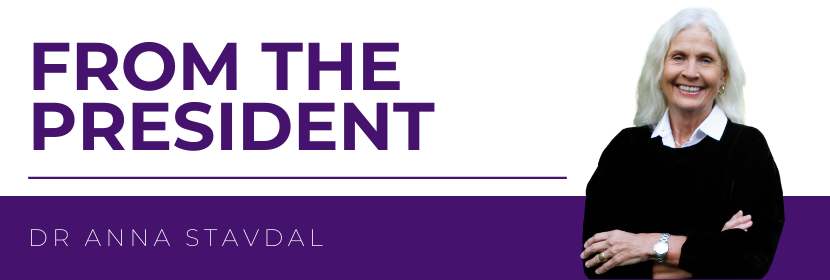From the President: March 2023

An Invitation to a Global Brainstorming Process
“For a definition to impact identity, members need to have a stake in it,
that sense of ownership that comes from having won it for themselves.”
A.S.-From my 2021 Inauguration as WONCA President
We are celebrating the 50th year of WONCA`s existence at a moment of increased global uncertainty, in the wake of a pandemic that has slammed into all sectors of society, of horrific natural catastrophes, of devastating armed conflicts, some spotlighted, others overlooked…
It would seem sensible to promise ourselves we’ll stop and reconsider our basic values and aims. Not now, but just as soon as things calm down. Given our urgency to act, we may brand it foolhardy, self-indulgent, even downright dangerous, to prioritize reflection now, in the midst of upheaval.
However: Imagine discovering, in the middle of a life-and-death journey, that you’ve been navigating according to an outdated map. There’s no way you’d simply keep on going. You’d cry out for an update, shocked that you hadn’t realized the problem earlier.
Besides: Things never do calm down. Change is an existential constant!
We’ll celebrate WONCA’s 50th Anniversary this October, in Sydney, Australia, where WONCA was founded back in 1972. This is an opportunity to take stock – once again! – to update our map of the aims and values Family Doctors share globally, to acknowledge the impressive and inspiring diversity of the contexts we live and work in. We can do this now, not despite the world’s ongoing upheavals but precisely because of them.
A Bit of Background
During the last not-so-calm half-century, Family Medicine has emerged as a widely recognized clinical specialty, complete with its own curriculum and research base. The historic breakthrough in that journey began in high-income, Western countries, with the development of the field as an academic discipline being led by people in those same countries. Impressively soon, Family Medicine expanded and our specialty has been recognized in a steadily increasing number of countries within each of our regions, although not yet in all of them.
At the same time and pace, WONCA has grown from a small sort of ‘club’ into an international professional organization – the only global network for Family Doctors. The organization’s complexity has also increased as the realities of the different local contexts are integrated into its structure. Helping to bridge this diversity of contexts is that hallmark of Primary Care in general, and of Family Medicine in particular:
The services we deliver within the community are tailored to meet local needs.
All this has been made possible in large part thanks to the contributions of our WONCA predecessors. They invested time and substantial effort in reflecting on how to define our specialty and describe our role. Their insights underpin much of the development of relevant curricula for undergraduate and postgraduate training, and of research agendas. Not least, they have helped Family Doctors to see the contours of our own working model and methods, and to recognize how these differ from other clinical specialties, those that are defined in terms of organ systems. That in turn helps us develop ways to explain such differences to co-workers and stakeholders, within and outside healthcare.
Societal changes and trends reshape healthcare. The effects of demographics, nature, religion, and general values within societies also impact the way health systems evolve structurally. Economics plays a huge role, as does politics. As change comes, it hits Primary Care first; we are the doorway, people’s point-of-entry into healthcare.
The implementation of the basic principles of our specialty is dependent on local context. Consequently, any process to conceptualize relevant definitions will require dynamic interaction. We ourselves, the Family Doctors, must be involved in the fundamental thinking, in discussing what course-adjustments to make, and, crucially, in pinpointing and addressing those inequities in the definition and use of power that have emerged within our highly complex international community.
A bit more of my Presidential Inauguration Speech seems appropriate to repeat here:
"Let’s consider how to improve the dialogues between the parts of our community – vertically, between the global, regional and local level organizations, and – horizontally, among WPs and SIGs. I’m especially looking forward to including young doctors in these dialogues.
But, remember: understanding our field is not something we do once and then we’ve got it. It’s an ongoing process. Life-long.
A strong sense of identity requires us to know both who we are and what we share, what unites us. Our values are our guiding principles. At the same time, practices and standards vary in different contexts, particularly when it comes to local needs and what the public demands. We can recognize our differences better when we’re aware of our common ground, and be better prepared to meet the challenges we face."
In Conclusion – or Rather: To Begin Again
The project to start
A Global Brainstorming Process on the Core Values of Family Medicine is launched. At the WONCA World conference in Sydney we will discuss in more detail.
I invite you to begin now to prepare for this collaborative process:
Please reflect on the values that mean most to you as a healthcare professional – both personally, within your specific context, and globally, within our shared profession.
My hope is that we – together – can conduct a broad choir of professional voices. I need your input. Share your thoughts and products, we have an inbox designated. Write to: CoreValues@wonca.net
Your voice matters.